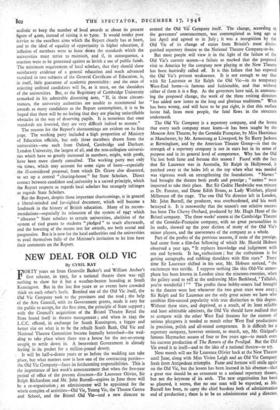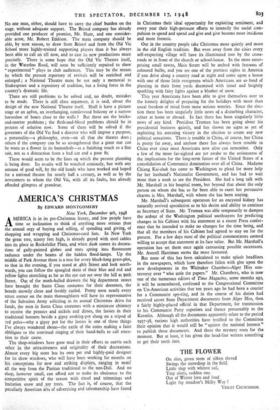NEW DEAL FOR OLD VIC
By CYRIL RAY • FORTY years on from Granville Barker's and William Archer's first scheme, in 1903, for a national theatre there was still nothing to show for it but a weather-beaten hoarding at South Kensington. But in the last five years or so events have crowded thick on each other's heels. Bombed out of the Old Vic itself, the
• Old Vic Company took to the provinces and the road ; the help of the Arts Council, with its Government grants, made it easy for the public to accept, for the first time, the principle of State support ; with the Council's acquisition of the Bristol Theatre Royal the State found itself in theatre management ; and when in 1945 the L.C.C. offered, in exchange for South Kensington, a bigger and better site on what is to be the rebuilt South Bank, Old Vic and National Theatre Committee became formally betrothed—the wed- ding to take place when there was a house for the not-so-young couple, to settle down in. A benevolent Government is already feeling in its pocket for a million-pound dowry.
It will be half-a-dozen years or so before the wedding can take place, but what matters now is how one of the contracting parties— the Old Vic Company—faces its forthcoming responsibilities. This is the importance of last week's announcement that when the five-year period of office of the present directors—Sir Laurence Olivier, Sir Ralph Richardson and Mr. John Burrell—expires in June there will be a re-organisation ; an administrator will be appointed for the whole complex of activities—Old Vic, Young Vic, the Theatre Centre and School, and the Bristol Old Vio—and a new director to control the Old Vic Company itself.: The change, according the governors' announcement,, was contemplated as long ago as last April and agreed to in July ; it was a recognition by the Old Vic of its change of status from Britain's most distin- guished repertory theatre to the National Theatre Company-to-be.
But most people will view it in the light of the failure of the Old Vic's current season—a failure so marked that the proposed visit to America by the company now playing at the New Theatre has been hurriedly called off. It is this failure that has exposed the Old Vic's present weaknesses. It is not enough to say that with Sir Laurence or Sir Ralph the Old Vic—in its temporary West-End home—is famous and fashionable, and that without either of them it is a flop. As the governors have said, in announc- ing the proposed change, the work of the three retiring directors "has added new lustre to the long and glorious traditions." What has been wrong, and will have to be put right, is that this surface lustre hid, from most people, the fatal flaws in the structure underneath.
The Old Vic Company is a repertory company, and the lesson that every such company must learn—it has been taught by the Moscow Arts Theatre, by the Comedic Francaise, by Miss Horniman at Manchester, by Mr. Armstrong at Liverpool; by Sir El arry Jackson at Birmingham, and by the American Theatre Group—is that the strength of a repertory company is not in stars but in its sense of purpose and in its general level of competence. Why has the Old Vic lost both fame and fortune this season ? Faced with the fact that Sir Laurence was in Australia, Sir Ralph in Hollywood, it patched away at the holes left at the top when What was needed was vigorous work on strengthening the foundations. " Names " had brought the theatre both profit and prestige ; " names " were
imported to take their place. But Sir Cedric Hardwicke was miscast as Dr. Faustus, and Dame Edith- Evans, as Lady Wishfort, played
Millamant off the stage. The one Old Vic director left in London, Mr. John Burrell, the producer, was overburdened, and his work betrayed it. It is noteworthy that the season's one relative success has been The Cherry' Orchard, produced by Mr. Hugh Hunt of the Bristol company. The three weeks' season at the Cambridge Theatre of the Comedie-Franaise company, with no great personalities in its ranks, showed up the poor diction of many of the Old Vic's minor players, and the unevenness of the company as a whole.
Part of the profits of the previous seasons, if none of the prestige, had come from a filth-fan following of which Mr. Harold Hobson observed a year ago, "It replaces knowledge and judgement with sex and hysteria. It has.enthusiasm ;" but the enthusiasm is for getting autographs and rubbing shoulders with film stars." Every time Sir Laurence shifted in his seat, Mr. Hobson noticed, "the excitement was terrific. I suppose nothing like this Old-Vic atmos- phere has been known in London since the nineteen-twenties, when the gallery used to yell at the undressing Miss Bankhead, Tallulah, you're wonderful I ' " The profits these bobby-soxers had brought to the theatre were lost whenever the two great stars -were away ; Sir Ralph and Sir Laurence are the only great actors we have who combine film-earned popularity with true distinction to this degree. Without these stars, and deprived, as a result,. of its least reliable and least admirable admirers, the Old Vic should have realised that to compete with the other West End theatres for the custom of serious playgoers it needed to match other West End productions in precision, polish and all-round competence. It is difficult for a repertory company, however eminent, to match, say, Mr. Gielgud's famous Haymarket season of four or five years ago—to match even his current production of The Return of the Prodigal. But the Old Vic owed it to itself—and to the idea of a national theatre—to try.
Next month will see Sir Laurence. Olivier back at the New Theatre until June; along with Miss Vivien Leigh and an Old Vic Company fresh from Antipodean triumphs. Fame and fortune will smile again on the Old Vic, but the lesson has been learned in his absence—that a great star should be an ornament to a national repertory theatre, but not the keystone of its arch. The new organisation has been so planned, it seems, that no one man will be expected, as Mr. Burrell has been, to carry the chief burdens both of administration and of production ; there is to be an administrator and director. No one man, either, should have to carry the chief burden on the stage. without adequate support. The Bristol company has already provided one producer of promise, Mr. Hunt, and one consider- able actor, Mr. Robert Eddison. The main company should be able, by next season, to draw from Bristol and from the Old Vic School more highly-trained supporting players than it has always been able to call on till now, and to cast its new productions more precisely. There is some hope that the Old Vic Theatre itself, in the Waterloo Road, will soon be sufficiently repaired to show "experimental" plays to club audiences. This May be the means by which the present repertory of revivals will be enriched and enlarged ; a National Theatre must be not only a memorial to Shakespeare and a repository of tradition, but a living force in the country's dramatic life.
There are still problems to be solved and, no doubt, mistakes to be made. There is still close argument, it is said, about the design of the new National Theatre itself. Shall it have a picture stage or an apion, an overhanging, cantilevered balcony or a narrow horseshoe of boxes close to the walls ? But these are the bricks- and-mortar problems ; the flesh-and-blood problems should be in process- of solution now. Some of them will be solved if the governors of the Old Vic find a director who will impose a purpose, a personality—a philosophy, even—on all that the theatre does ; others if the company can be so strengthened that a great star can be worn as a flower in its buttonhole—as a finishing touch to a fine suit, not as a distraction from a bad cut and a poor fit.
These would seem to be the lines op which the present planning is being done. Its results will be watched anxiously, but with any amount of good will, by the old hands who have Forked and hoped for a national theatre for nearly half a century, as well as by the newcomers to whom the Old Vic, with all its faults, has already afforded glimpses of grandeur.



































 Previous page
Previous page